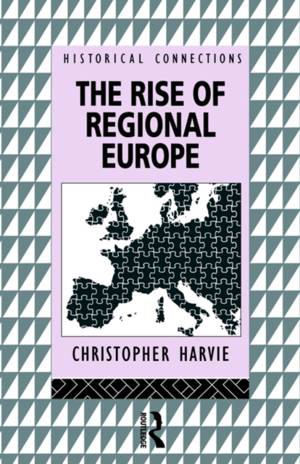
- Afhalen na 1 uur in een winkel met voorraad
- Gratis thuislevering in België vanaf € 30
- Ruim aanbod met 7 miljoen producten
- Afhalen na 1 uur in een winkel met voorraad
- Gratis thuislevering in België vanaf € 30
- Ruim aanbod met 7 miljoen producten
Zoeken
€ 53,45
+ 106 punten
Uitvoering
Omschrijving
In the 1970s and 1980s there was a steady transfer of power in mainland Europe to new, powerful regional authorities and these, in their turn, started to build up a new form of intra-European co-operation. With the acceleration of European integration, the rise of the multinational firm and new media and transport technologies, the traditional defence-based nation-states are under threat.
In this challenging study, Christopher Harvie alters the ways in which we have traditionally surveyed the European past by setting the positive and negative aspects of the present European situation in their historical context. He reappraises the actors of `national' politics, the persistence of types of civic and internationalist discourse and finally looks at the transactions which have created `bourgeois regionalism', and its implications for the future of Europe. Harvie argues that we are only beginning to realise the shift in consciousness, as well as in politics and administration, that an integrated Europe will involve.
In this challenging study, Christopher Harvie alters the ways in which we have traditionally surveyed the European past by setting the positive and negative aspects of the present European situation in their historical context. He reappraises the actors of `national' politics, the persistence of types of civic and internationalist discourse and finally looks at the transactions which have created `bourgeois regionalism', and its implications for the future of Europe. Harvie argues that we are only beginning to realise the shift in consciousness, as well as in politics and administration, that an integrated Europe will involve.
Specificaties
Betrokkenen
- Auteur(s):
- Uitgeverij:
Inhoud
- Aantal bladzijden:
- 108
- Taal:
- Engels
- Reeks:
Eigenschappen
- Productcode (EAN):
- 9780415095235
- Verschijningsdatum:
- 9/12/1993
- Uitvoering:
- Paperback
- Formaat:
- Trade paperback (VS)
- Afmetingen:
- 140 mm x 216 mm
- Gewicht:
- 149 g

Alleen bij Standaard Boekhandel
+ 106 punten op je klantenkaart van Standaard Boekhandel
Beoordelingen
We publiceren alleen reviews die voldoen aan de voorwaarden voor reviews. Bekijk onze voorwaarden voor reviews.











